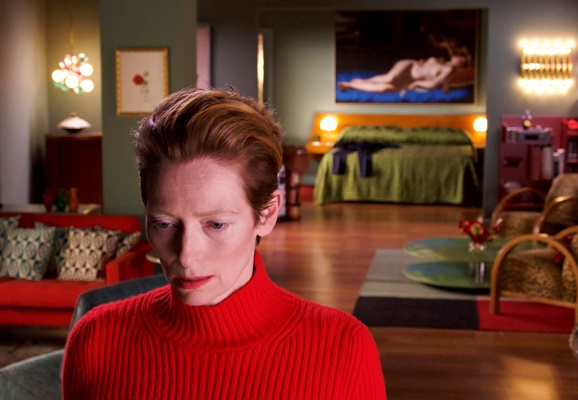
For the last 21 years, the New York Film Festival has presented all but one of Spanish director Pedro Almodóvar’s feature films, and he last appeared at the NYFF with Pain and Glory in 2019. This year is no exception, although like all of its programming and post-screening Q&As, the event will not be in-person but online. Filmed just a few months ago and fresh from its premiere at the Venice Film Festival, The Human Voice becomes the filmmaker’s eighth film screened at the annual autumnal festival since All About My Mother.
In only 30 minutes, Almodóvar’s elegant take on Jean Cocteau’s 1930 one-act/one-woman meltdown packs more drama than many movies four times its length. Working for the first time in English, the director “freely,” as the credits say, adapts the play as a showcase for Tilda Swinton, who follows in the formidable footsteps of Anna Magnani in Roberto Rossellini’s claustrophobic version in the L’Amore anthology (1948) and more recently Sophia Loren in son Eduardo Ponti’s Human Voice from 2014, in which the star gives one of her most raw and well-defined performances. (Both versions are currently streaming on the Criterion Channel.)
From the color-coordinated sets—dominated by blues, reds, and greens—and the melancholic slow waltz by composer and Almodóvar regular Alberto Iglesias, the viewer knows immediately who’s in charge. Yet the filmmaker remains faithful to the playwright, in his own fashion, with the story tweaked for a modern-day setting and not succumbing to a pity party.
Over the telephone, an unnamed woman confronts the man who has dumped her for good three days earlier and moved out and on. She knows from the first ring she will never see him again and that this will be their last contact and presumably her last great love. Almodóvar signals the artifice of the production right away by exposing the film’s set within a cavernous soundstage. When Swinton makes her diva-like entrance, she walks across the soundstage like a somnambulist, dressed in a scarlet red bell-shaped ball gown. Yet it doesn’t matter that we know this is only a movie; what follows is convincing and absorbing.
Although the stage is set for a high-gloss melodrama, Swinton’s performance is more low-key and conversational than the previous film versions. Its tone is less Carmen Maura in the director’s 1980s work such as Law of Desire but more internalized—think Antonio Banderas from last year’s Pain and Glory. Although the lover’s voice is never heard, you would swear that you can hear his dialogue because of Swinton’s focus and spontaneity. The actress has a technological advantage that Magnani or Loren did not have: freedom of movement thanks to Bluetooth. (Loren’s version is set in 1950 Naples in the days of the party line.)
In perhaps the most crucial change from the other interpretations, there’s more anger and resignation here. Those familiar with Cocteau may be left waiting for a full-on operatic breakdown—for that, go to Magnani. The dialogue still builds to a confrontation as the woman drops her calm, nonchalant façade and lets the man know how she really feels. Still, Swinton holds back a bit, though still threatening to explode at any moment. The director and the actress offer a taste of the distraught woman’s rancor and bitterness, playfully leading us on and leaving us wanting more.
Though the source material is 90 years old, this is no retro exercise or an occasion to wallow in misery or victimhood. (Come to think of it, Lionel Bart’s “As Long as He Needs Me” torch song would suit this material perfectly.) Unlike her onscreen forebears, Swinton’s jilted character has options they did not have, and Almodóvar imagines what happens to his heroine after she hangs up the phone for the last time. Both the play and all three film adaptations capture a moment in time, but Almodóvar hints at the woman’s future and ends the drama on a hopeful note. If nothing else, the eye-opening, vibrant color design of her apartment is vibrant enough that it could take on the form of Xanax, if she ever decides to seek relief from depression.
The Human Voice will be released by Sony Pictures Classics.






Leave A Comment